News Post
FROM THE ALABAMA LAWYER: Justice Samuel Alston Beatty - A Reminiscence
Published on March 25, 2021
|
Getting your Trinity Audio player ready...
|
By Patrick H. Graves, Jr. and Edward L. Hardin, Jr.
Samuel Alston Beatty was a man of many titles and talents: lieutenant, bomber pilot, member of the Greatest Generation, major, lawyer, doctor, professor, assistant dean, dean, and judge. He can be described by many adjectives: smart, humorous, devilish, animated, irascible, persistent, outgoing, larger than life and testy.
Sam was born in 1923 to Eugene Columbus Beatty (1886-1964) and Rosa Bell Horton (1884-1973) in Tuscaloosa, graduating from high school in 1939 at 16. 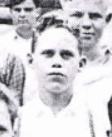 This photograph is from the 1938 yearbook.
This photograph is from the 1938 yearbook.
In February 1942 at the age of 19, Sam dropped out of the University of Alabama and enlisted in the Army Air Corps. He trained at many locations in the states. Following training, Sam was assigned to the 69th Squadron, 42d Bomb Group of the XIII Bomber Command, piloting a North American B-25 Mitchell, a medium bomber, of the Doolittle-raid fame. It was also the plane flown by the fictional 256th Squadron in Joseph Heller’s satirical novel Catch-22. 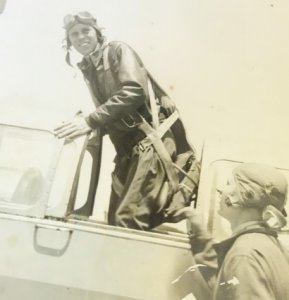
In May 1943, Lieutenant Beatty flew his bomber named “Sweet Pea” from California to Hawaii, a 2300-mile 13-hour hop. The bomber then island-hopped another 3000 miles to Fiji. Initially, the 69th operated out of the Guadalcanal conducting low-altitude raids on Japanese ports including skip-bombing ships at Bougainville. He described his first mission:
We had 12 planes in our first mission to Kahili Airfield on Bougainville and we expected 100 percent losses, but we lost only one plane. We went in on the deck at dusk, lined up six abreast, firing everything we had and going in as fast as we could. As soon as we hit the ridge to come down toward Kahili Airfield dark became daytime. Their antiaircraft fire and ours lit up the sky….1
His second combat tour was in the Russell Islands, attacking the large Japanese base at Rabaul, New Britain Island. Beatty earned the nom de guerre “Lucky” at Rabaul. His B-25 was hit by enemy flak 15 times in 25 missions, 12 of them consecutively. A Movietone cameraman accompanied “Sweet Pea” on a Rabaul raid. His unsourced article reported that a ton and half of bombs were dropped on the dock and wharf area of the city and added:
The Japanese showed their appreciation by contributing a thick barrage of anti-aircraft, only one shrapnel of which pierced the hull. A community sing was held over the interphone system of the bomber. The bomber mission began with, “When the Roll is Called Up Yonder.” Over the target the party sang “I’m only a Bird in a Gilded Cage,” followed immediately by “I Want’a Go Home.” Turret gunner Hartley was off key several times having been nicked by anti-aircraft fire on a previous mission. 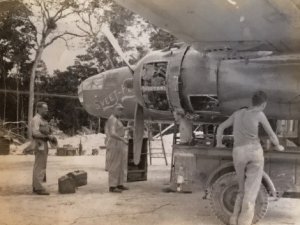
This photograph shows Sam (back to camera) and his crew performing maintenance on “Sweet Pea” somewhere in the South Pacific.
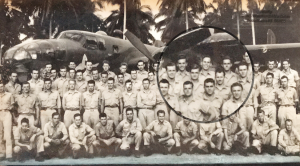
After 15 months and 60 missions, the 35th of which was on his 21st birthday, Sam returned to the states in July 1944 as an instructor at Albany, Georgia. On his last training mission, he flew over Tuscaloosa. Grabbing the controls, Sam told his students, “This is how it’s done,” buzzing his hometown in several passes. One telling had him flying under the Fosters Ferry bridge on Highway 11.
Lieutenant Beatty was awarded the Air Medal with seven bronze oak leaf clusters.
In 2007, Sam recorded a 1:37 hour video of his war experiences. He was 84. His memory and clarity of mind were truly remarkable. He told of the many terrifying raids on the large port at Rabaul. The video can be viewed here.
Sam returned to the University of Alabama and finished undergraduate school in 1948. Former Justice of the Supreme Court Champ Lyons remembers a story Sam told about his return to the university: “When I enrolled in the University of Alabama, a cocky ‘frat boy’ told me I needed to join a fraternity to prove my manhood. I told him, ‘Son, I just finished flying 60 missions in a B-25 over the Pacific and several times almost got my rear end shot off. I don’t have to prove my manhood to you or anyone else.’”
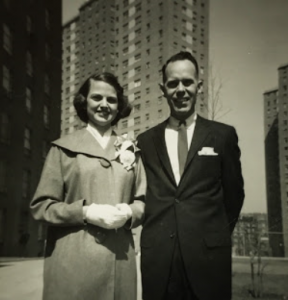 Sam married Maude Applegate (known fondly as “Apple”) in 1949. Apple’s brother was killed in Europe during the war.
Sam married Maude Applegate (known fondly as “Apple”) in 1949. Apple’s brother was killed in Europe during the war.
In 1953 Sam graduated from the University of Alabama School of Law, first in his class. 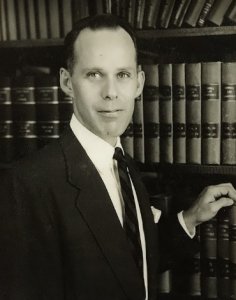
Following a brief law practice and at Dean Harrison’s urging, Sam became a member of the faculty at the University of Alabama School of Law in 1955. Sam was awarded a Ford Foundation fellowship to pursue graduate studies at Columbia University where he earned a master’s degree (1959) and a Doctorate of Juridical Law (J.S.D.) (1964). While at Alabama, he taught criminal law, evidence, equity, contracts, and negotiable instruments.
Sam retired as a reserve major in the Air Force Judge Advocate General Corps.
Sam attributed his teaching techniques to training as an air cadet. The best accounts of his teaching career and methods in Farrah Hall come from his students. To keep the student’s attention, reduce boredom, and drive home a point, Sam often resorted to theatrics. Judge Art Hanes notes Beatty’s unsurpassed talent for needling students and lawyers, a penchant in which he reveled and carried out with great humor.
One of Dr. Beatty’s no-no’s was being late to class. One spring morning in 1964, Bill Baxley arrived late for class. Ed Hardin tells of Baxley’s entry into Sam’s class:
“Glad you could drop in for a visit Mr. Baxley, but this is the third time you have been late for my class. So, you can turn around and go back through the doors you just came in and don’t ever come through those doors again.” Baxley mumbled, “Yes sir, Dr. Beatty” and left. As Beatty started his next class, a scuffing noise came from an open window at the back of the classroom. Everyone turned around to see Baxley climbing through the window. Beatty said in a loud voice, “Mr. Baxley, I told you not to come in my class again! Didn’t you hear me?” Baxley responded, “Dr. Beatty, sir, you told me not to come through those doors again. I need this class to graduate.” Beatty responded, “Well, at least you listen carefully. Now sit down and don’t be late again.”
In 1969, Sam’s criminal law classroom had frosted windows on the doors. As he began a class one morning, Sam noticed his students looking at the door. The image of a student appeared, listening to see if Dr. Beatty had arrived. Sam signaled for the class to be quiet and, continuing his lecture, crouched and stealthily pranced to the door. He flung it open and chased the hapless student down the hall, growling in a loud voice.
Sam hated yellow shirts. A story goes that he called on a student at the start of a class and kept him up the entire hour. When the class ended, Dr. Beatty told the shell-shocked student, “Don’t ever wear a yellow shirt in my class again.” Don Sweeney of the Montgomery bar made the mistake of wearing an offending yellow shirt to class. Sam had Don stand on his desk and repeatedly sing “Blue Suede Shoes.”
Judge Harold Albritton of the U. S. District Court for the Middle District of Alabama remembers being in Beatty’s class during a discussion of causes of action. Sam threw a book at a student. It missed. Beatty: “Since it missed you, that was an assault. Had I hit you, it would have been an assault and battery.”
Arthur Stephens tells of an event involving future Chief Justice Ernest C. “Sonny” Hornsby. Sam called on Sonny to speak about the elements of first-degree murder. As Sonny fumbled with his book, Sam ripped the pertinent page from his own book and gave it to his frustrated student.
Judge Lyons tells of a practice by Dean Harrison near exams that allowed students to turn in “unprepared slips” before class to avoid the embarrassment of not being prepared. Dr. Beatty disapproved of the practice. At the end of the third-year semester when all were worried about exams, the stack of slips on the Dean’s desk was quite large. As Sam finished up a lecture in the same classroom, he noticed the stack of slips. With that devilish glint in his eye for which he was famous, Sam snatched up the slips, made a show of wadding them up, and stuffed them in his pocket. He faced the Dean’s class and with a fiendish grin exited the room, giving a forceful one-finger salute. The class stampeded to put new slips on the Dean’s desk.
During a summer school session, Sam declared helmet day on which all had to don a helmet of some sort. Those students who did not were called upon to recite.
Tuscaloosa lawyer Wilbor J. Hust found Sam on a jury venire. The opposing lawyer asked if any knew Wilbor. Dr. Beatty stood up and said he had taught Wilbor in law school. The opposing lawyer reminded Beatty that he too had been one of his students. Spying an opening, Sam responded, “Maybe, but you sure did not stand out.”
Mobile lawyer Broox G. Holmes was in Beatty’s criminal law class during a discussion of “breaking the close.” As a student was reciting, Sam began picking up items off desks and putting them in a suitcase. He then left the room. Finally, someone said “he’s gone.” And he was. In the next class, he called on a student, and asked “what was that?” The student asked “Sir?” Sam responded, “You saw me pick up those things, put them in my suitcase, and leave the room, didn’t you?”
It was not easy to get the best of Sam Beatty. One who did was the late Bobby Faulk. Sam stood Bobby up and asked him to explain the crime that involved fencing stolen TVs. Bobby responded “Dr. Beatty, I don’t know but if you can get them, I can move them for you.” But Sam got even. Bobby, who often hunted with Beatty, confronted Sam about a bad grade. Sam retorted, “if you spent more time studying and not hunting, maybe the grade would have been better.”
In 1970, Sam served as the dean of the law school at Mercer University in Macon, Georgia, for four years. He later served as Chief of the Civil Division for Attorney General Baxley.
In 1976, a group of former law students persuaded Sam to run for the Alabama Supreme Court. He won and again in 1982, serving 12 years before retiring in 1989. Milton Coxwell, Jr., of Monroeville, argued a case before the Court, representing a used car dealer who lost an automobile in a fire. The insurance company took the position that the owner’s fraudulent statements in the proof of loss voided the policy. Milton found an old case in which a ship had gone down in Mobile Bay with a cargo of whiskey. The owner had misrepresented the quality and quantity of the cargo but the court did not void the policy. Justice Beatty stated, “Mr. Coxwell, you have argued your position ably, and you might even be right. But let’s move on to more important matters. Do you have any intelligence as to the location of that cargo of whiskey?” … a rare moment of levity in the Court….
Judge Art Hanes granted summary judgment on a routine dispute. On appeal Justice Beatty affirmed the order and attached a note, “Hanes, I did this because I love you, but you still don’t know anything about contracts. S.A.B.”
Sam created a business card while practicing law in Birmingham after retiring from the bench, stating in part: “The greatest law giver since Moses, Hammurabi and Judge Roy Bean.”
Samuel Alston Beatty, 91, left us on May 21, 2014, survived by Apple, their children, Rosa Beatty Lord and Eugene Applegate Beatty, both law school graduates, and grandchildren. Sam and Apple’s 61 years together are a testament to Sam’s excellent choice of a mate and Apple’s perseverance.
End notes:
[1] Delbert Reed, All of Us Fought the War: The University of Alabama Men and Women in World War II (Tuscaloosa: The University of Alabama Press, 2012) 74.
[2] Attempts to locate the Movietone footage have not been successful. YouTube has footage of numerous B-25 raids on Rabaul.
______
Patrick H. Graves, Jr., is a retired partner in the Huntsville office of Bradley Arant Boult Cummings, LLP. He graduated from West Point in 1964 and served two tours in Vietnam as an infantry platoon leader, aide-de-camp, and rifle company commander. He graduated from the University of Alabama School of Law in 1972. In retirement he is writing family history and his adventures at West Point and in the Army.
Edward (Ed) L. Hardin, Jr. graduated from Birmingham Southern College (BA 1962 and Doctor of Laws, Hon.Causa (2019). He graduated from the University of Alabama School of Law in 1965. From 1965 to 1998 he engaged in the private practice of law in Birmingham focusing on civil litigation. From 1998 to 2007, he served as Executive Vice-President, General Counsel, and Director of Caremark, Inc.(CMX-NYSE). After Caremark’s merger with CVS, Inc., he joined the Birmingham office of Burr Forman, LLP as counsel. Since January 1, 2019, he has limited his practice to consulting in select complex civil litigation matters.
Credits: Sam’s son, Gene Beatty, who provided much information and photos. David Durham and Andrew Toler, the University of Alabama Bounds Law Library. Monique Fields at the University of Alabama School of Law. The many contributors of stories.